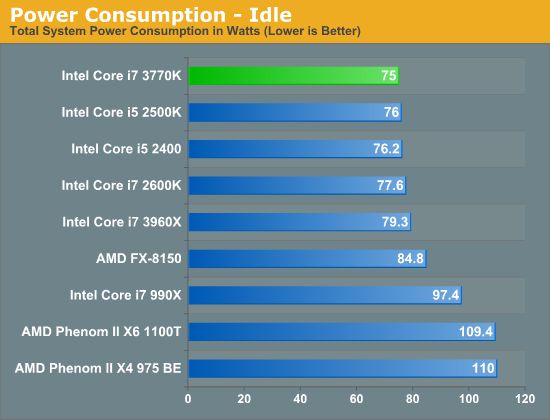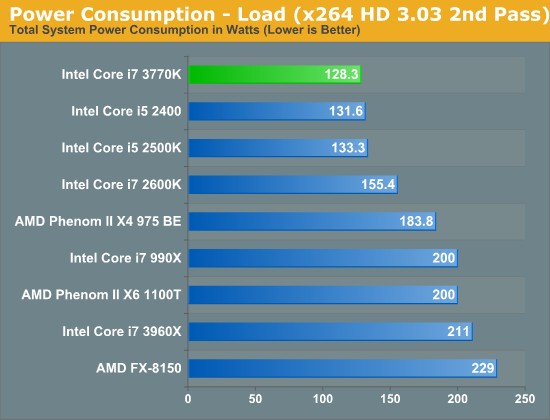The Intel Ivy Bridge (Core i7 3770K) Review
by Anand Lal Shimpi & Ryan Smith on April 23, 2012 12:03 PM EST- Posted in
- CPUs
- Intel
- Ivy Bridge
Power Consumption
Intel isn't really exploiting 22nm for significantly higher default or max turbo frequencies. While it does seem like you'll hit turbo frequencies more often with Ivy, most of what 22nm offers will be realized as power savings.
The data in the charts below is from our original 3770K preview, however I've also provided a table comparing the 3770K to the 2700K using Intel's own Z77 motherboard which is a bit more power hungry than our typical testbed:
| Power Consumption Comparison | ||||
| Intel DZ77GA-70K | Idle | Load (x264 2nd pass) | ||
| Intel Core i7 3770K | 80.1W | 146.4W | ||
| Intel Core i7 2700K | 79.4W | 177.6W | ||
As you can see, there are no savings at idle and a reasonably significant improvement under load.
The same is echoed on our earlier chip in a more power efficient platform:


I was also curious to see what power consumption would look like compared to other low-end GPUs. For these next results I used the 3770K alone, without a discrete card and measured power consumption. I then added in discrete GPUs from our HD 4000 comparisons and looked at both idle and load power while playing Metro 2033:

Obviously at idle it's impossible to beat the HD 4000, the GPU is largely stopped/gated when idle keeping power consumption to a minimum. Under load is where things get interesting:

Ivy's GPU is much more power efficient than SNB's, however Intel still has a way to go before it starts to equal the power efficiency of modern discrete GPU architectures. Remember the HD 4000 is on Intel's 22nm process here while the GT 440 is built on TSMC's 40nm process.










173 Comments
View All Comments
ijozic - Thursday, April 26, 2012 - link
Maybe because people who prefer to have the IPS screen would also like to have support for graphics switching to have a nice battery life while not doing anything GPU intensive. This was the one thing I expected from Ivy Bridge upgrade and NADA.uibo - Monday, April 23, 2012 - link
Does anyone know if the 24Hz issue has been resolved?uibo - Monday, April 23, 2012 - link
nevermind just saw the htpc perspective reviewanirudhs - Monday, April 23, 2012 - link
I didn't notice that issue. 23.976*1000 = 23976 frames, 24 * 1000 = 24000 frames, in 16 mins 40 secs. So that's about one second of mismatch for every 1000 seconds. I could not notice this discrepancy while playing a Blu Ray on my PC. Could you?Old_Fogie_Late_Bloomer - Monday, April 23, 2012 - link
Okay, well, I'm pretty sure that you would notice two seconds of discrepancy between audio and video after half an hour of viewing, or four seconds after an hour, or eight seconds by the end of a two-hour movie.However, the issue is actually more like having a duplicated frame every 40 seconds or so, causing a visible stutter, which seems like it would be really obnoxious if you started seeing it. I don't use the on-board SB video, so I can't speak to it, but clearly it is an issue for many people.
JarredWalton - Monday, April 23, 2012 - link
I watch Hulu and Netflix streams on a regular basis. They do far more than "stutter" one frame out of every 960. And yet, I'm fine with their quality and so our millions of other viewers. I think the crowd that really gets irritated by the 23.976 FPS problems is diminishingly small. Losing A/V sync would be a horrible problem, but AFAIK that's not what happens so really it's just a little 0.04 second "hitch" every 40 seconds.Old_Fogie_Late_Bloomer - Monday, April 23, 2012 - link
Well, I can certainly appreciate that argument; I don't really use either of those services, but I know from experience they can be glitchy. On the other hand, if I'm watching a DVD (or <ahem> some other video file <ahem>) and it skips even a little bit, I know that I will notice it and usually it drives me nuts.I'm not saying that it's a good (or, for that matter, bad) thing that I react that way, and I know that most people would think that I was being overly sensitive (which is cool, I guess, but people ARE different from one another). The point is, if the movie stutters every 40 seconds, there are definitely people who will notice. They will especially notice if everything else about the viewing experience is great. And I think it's understandable if they are disappointed at a not insignificant flaw in what is otherwise a good product.
Now, if my math is right, it sounds like they've really got the problem down to once every six-and-a-half minutes, rather than every 40 seconds. You know, for me, I could probably live with that in an HTPC. But I certainly wouldn't presume to speak for everyone.
anirudhs - Tuesday, April 24, 2012 - link
I will get a discrete GPU and then do a comparison.anirudhs - Monday, April 23, 2012 - link
a discrete GPU! I could use a bump in transcoding performance for my ever-growing library of Blu-Rays.chizow - Monday, April 23, 2012 - link
Looks like my concerns a few years ago with Intel's decision to go on-package and eventually on-die GPU were well warranted.It seems as if Intel will be focusing much of the benefits from smaller process nodes toward improving GPU performance rather than CPU performance with that additional transistor budget and power saving.
I guess we will have to wait for IVB-E before we get a real significant jump in performance in the CPU segment, but I'm really not that optimistic at this point.